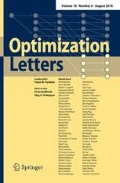Abstract
In this paper we consider the single machine scheduling problem with truncated exponential learning functions. By the truncated exponential learning functions, we mean that the actual job processing time is a function which depends not only on the total normal processing times of the jobs already processed but also on a control parameter. The use of the truncated function is to model the phenomenon that the learning of a human activity is limited. We show that even with the introduction of the proposed model to job processing times, several single machine problems remain polynomially solvable. For the following three objective functions, the total weighted completion time, the discounted total weighted completion time, the maximum lateness, we present heuristic algorithms according to the corresponding problems without truncated exponential learning functions. We also analyse the worst-case bound of our heuristic algorithms.
Similar content being viewed by others
References
Badiru A.B.: Computational survey of univariate and multivariate learning curve models. IEEE Trans. Eng. Manag. 39, 176–188 (1992)
Biskup D.: Single-machine scheduling with learning considerations. Eur. J. Oper. Res. 115, 173–178 (1999)
Biskup D.: A state-of-the-art review on scheduling with learning effects. Eur. J. Oper. Res. 188, 315–329 (2008)
Cheng T.C.E., Cheng S.-R., Wu W.-H., Hsu P.-H., Wu C.-C.: A two-agent single-machine scheduling problem with truncated sum-of-processing-times-based learning considerations. Comput. Industr. Eng. 60, 534–541 (2011)
Cheng T.C.E., Lai P.-J., Wu C.-C., Lee W.-C.: Single-machine scheduling with sum-of-logarithm-processing-times-based learning considerations. Inform. Sci. 179, 3127–3135 (2009)
Cheng T.C.E., Wang G.: Single machine scheduling with learning effect considerations. Ann. Oper. Res. 98, 273–290 (2000)
Cheng T.C.E., Wu C.-C., Lee W.-C.: Some scheduling problems with deteriorating jobs and learning effects. Comput. Industr. Eng. 54, 972–982 (2008)
Cheng T.C.E., Wu C.-C., Lee W.-C.: Some scheduling problems with sum-of-processing-times-based and job-position-based learning effects. Inform. Sci. 178, 2476–2487 (2008)
Floudas C.A., Pardalos P.M.: Encyclopedia of Optimization, 2nd edn. Springer, Berlin (2009)
Graham R.L., Lawler E.L., Lenstra J.K., Rinnooy Kan A.H.G.: Optimization and approximation in deterministic sequencing and scheduling: a survey. Ann. Discret. Math. 5, 287–326 (1979)
Hadda H.: A (\({\frac{4}{3}}\))-approximation algorithm for a special case of the two machine flow shop problem with several availability constraints. Optim. Lett. 3, 583–592 (2009)
Lai P.J., Lee W.C.: Single-machine scheduling with general sum-of-processing-time-based and position-based learning effects. Omega Int. J. Manag. Sci. 39, 467–471 (2011)
Lee W.C.: Scheduling with general position-based learning curves. Inform. Sci. 181, 5515–5522 (2011)
Lee W.-C., Wu C.-C.: Some single-machine and m-machine flowshop scheduling problems with learning considerations. Inform. Sci. 179, 3885–3892 (2009)
Lee W.-C., Wu C.-C.: A note on single-machine group scheduling problems with position-based learning effect. Appl. Math. Model. 33, 2159–2163 (2009)
Lee C.-Y., Yu G.: Parallel-machine scheduling under potential disruption. Optim. Lett. 2, 27–37 (2008)
Mosheiov G.: Minimizing total absolute deviation of job completion times: extensions to position-dependent processing times and parallel identical machines. J. Oper. Res. Soc. 59, 1422–1424 (2008)
Pardalos P.M., Resende M.G.C.: Handbook of Applied Optimization. Oxford Univ Press, Oxford (2002)
Pardalos P.M.: Complexity in Numerical Optimization. World Scientific, Singapore (1993)
Setamaa-Karkkainen A., Miettinen K., Vuori J.: Heuristic for a new multiobjective scheduling problem. Optim. Lett. 1, 213–225 (2007)
Pinedo M.: Scheduling: Theory, Algorithms, and Systems. Prentice-Hall, Upper Saddle River (2002)
Smith W.E.: Various optimizers for single state production. Naval Res. Log. Quart. 3, 59–66 (1956)
Townsend W.: The single machine problem with quadratic penalty function of completion times: a branch-and-bound solution. Manag. Sci. 24, 530–534 (1978)
Wang J.-B., Li J.-X.: Single machine past-sequence-dependent setup times scheduling with general position-dependent and time-dependent learning effects. Appl. Math. Model. 35, 1388–1395 (2011)
Wang J.-B., Sun L.-H., Sun L.-Y.: Single machine scheduling with a learning effect and discounted costs. Int. J. Adv. Manufact. Technol. 49, 1141–1149 (2010)
Wang J.-B., Wang M.-Z.: Single machine multiple common due dates scheduling with general job-dependent learning curves. Comput. Math. Appl. 60, 2998–3002 (2010)
Wang J.-B., Wang M.-Z.: A revision of machine scheduling problems with a general learning effect. Math. Comput. Model. 53, 330–336 (2011)
Wang J.-B., Wang M.-Z.: Worst-case behavior of simple sequencing rules in flow shop scheduling with general position-dependent learning effects. Ann. Oper. Res. 191, 155–169 (2011)
Wang, J.-B., Wang, M.-Z.: Single-machine scheduling with nonlinear deterioration. Optim. Lett. doi:10.1007/s11590-010-0253-3
Wang, J.-B., Ji, P., Cheng, T.C.E., Wang, D.: Minimizing makespan in a two-machine flow shop with effects of deterioration and learning. Optim. Lett. doi:10.1007/s11590-011-0334-y
Wang J.-J., Wang J.-B., Wang X.-P.: Scheduling problems with exponential learning functions. Int. J. Innovat. Comput. Inform. Control 6, 3265–3274 (2010)
Wang J.-B., Wang D., Wang L.-Y., Lin L., Yin N., Wang W.-W.: Single machine scheduling with exponential time-dependent learning effect and past-sequence-dependent setup times. Comput. Math. Appl. 57, 9–16 (2009)
Wright T.P.: Factors affecting the cost of airplanes. J. Aeronaut. Sci. 3, 122–128 (1936)
Wu C.-C., Lee W.-C.: Single-machine and flowshop scheduling with a general learning effect model. Comput. Industr. Eng. 56, 1553–1558 (2009)
Wu C.-C., Yin Y., Cheng S.-R.: Some single-machine scheduling problems with a truncation learning effect. Comput. Industr. Eng. 60, 790–795 (2011)
Yang D.-L., Kuo W.-H.: Single-machine scheduling with both deterioration and learning effects. Ann. Oper. Res. 172, 315–327 (2009)
Yang D.-L., Kuo W.-H.: Some scheduling problems with deteriorating jobs and learning effects. Comput. Industr. Eng. 58, 25–28 (2010)
Yin Y., Xu D., Sun K., Li H.: Some scheduling problems with general position-dependent and time-dependent learning effects. Inform. Sci. 179, 2416–2425 (2009)
Zhao C.-L., Tang H.-Y.: A note on two-machine no-wait flow shop scheduling with deteriorating jobs and machine availability constraints. Optim. Lett. 5, 183–190 (2011)
Author information
Authors and Affiliations
Corresponding author
Rights and permissions
About this article
Cite this article
Wang, JB., Wang, XY., Sun, LH. et al. Scheduling jobs with truncated exponential learning functions. Optim Lett 7, 1857–1873 (2013). https://doi.org/10.1007/s11590-011-0433-9
Received:
Accepted:
Published:
Issue Date:
DOI: https://doi.org/10.1007/s11590-011-0433-9


